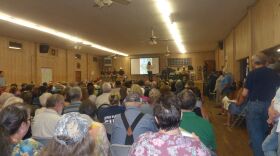“My state is on fire.” Those are the words of Oregon’s Senate President Peter Courtney, as he joined other congressional representatives to ask for federal funding for wildfire suppression. Twenty six fires continue to burn around the state. Thousands of fire fighters are dispatched—working in harsh conditions for weeks at a time. One of them is Sam Swetland. I’ve known Sam a long time—but not as long as he’s been fighting fires.
“In 1976, I took a summer job with the Forest Service.”
In Fire Management, Swetland worked his way up from ground to engine crew to Air Operations. Extensive training and experience makes him one of a handful of people able to deal with all the moving parts of Air Attack.
Swetland: “You’re dealing with firefighters, fire behavior, tactics and strategies to suppress fires as well as supporting what they want on the ground with aircraft, retardant or helicopter bucket drops.”
Most fire fighters retire at 57. But not this guy. Swetland turns 65 this year but each fire season, they call him back.
Swetland: “Yeah. So 42 fire seasons ago now.”
Swetland has travelled most of the country fighting fires. Over all these years, he’s managed to keep his home base —with his wife and kids—on the McKenzie River. The Horse Creek complex and other fires continue to threaten communities here.

Reporter: “Here we are sitting in your kitchen up in beautiful Blue River. It is smoky outside. What is this like for you historically? Can you remember a time when it was this bad?”
Swetland: “Not here, not from wildfires. This is a big event. I’ve been in a lot of other areas other places that it’s happened. I’ve just never experienced it at home.”
Reporter: “Are you concerned? You know a lot of the men and women out there working right now to fight these fires. How are you feeling?
Swetland: “Oh, I’m good with the people that are out there. They are well trained, careful, taking care of each other. The fire conditions—that’s another thing. I’m just thinking about people I know—we helped move some belongings of a friend --get him ready to evacuate if he needs to. It’s really got me thinking about the Level 1 evacuation. It’s something that could happen anywhere if you have woods around you—the conditions now are dry. A fire started accidentally or stupidly by somebody- that fire could be right next to you and you’d be from LEVEL “not thinking about it” to Level 1,2, or 3 in a very short time.”

Swetland is in air ops, but he has no illusions about how fires are ultimately extinguished.
Swetland: “Fire’s don’t go out without boots on the ground. That’s what they say-- Air craft don’t put it out, water doesn’t put it out—just people swinging tools.”
Reporter: “I think that when it gets down to it the average person doesn’t understand—‘Water doesn’t put it out? What do you mean?’”
Swetland: “Oh water has to get to the right places. It has to cool the fuel down. You just pour it on top, stuff will be burning underneath it’ll just come right back.”
People often ask this veteran fire fighter how crews decide what to save and what to let burn. Swetland says if he’s on a larger fire or making decisions where a lot more people are involved-- then he will look strategically at what values are at risk.
VSwetland: “It could be campgrounds, highways, natural resources, timber, salmon, owls, all of those things are considered values. Then we decide if the strategy is to go directly in and suppress it—or there’s parts of it that could burn without suppression without harming other values.”
Reporter: “As predictable as fire behavior might seem. It’s not always is it? We have lost fire fighters in unimaginable ways—right? because of—what?”
Swetland: “Extreme fire behavior is predictable and weather is predictable. The people that we have lost were making the best decision they could with the information they had. It’s easy to say somebody didn’t do this or that- that they should have done. But I wasn’t there so I can’t say that.”
Reporter: “The pressing question. Why do you keep doing this? You came back with the crud…“
“Oh, that’s upper respiratory illness,” Swetland says. “There’s dust and many hundreds of people in a fire camp. Oh, It’s a good job. It accomplishes good things. There’s not an abundance of people with air operations. So they call and ask (laugh.) I had a tee shirt once that said ‘The voices in my head tell me to.’ That’s why I fight fire.”
As would be expected—Sam Swetland is heading out on another assignment. They called and he answered. Again.






